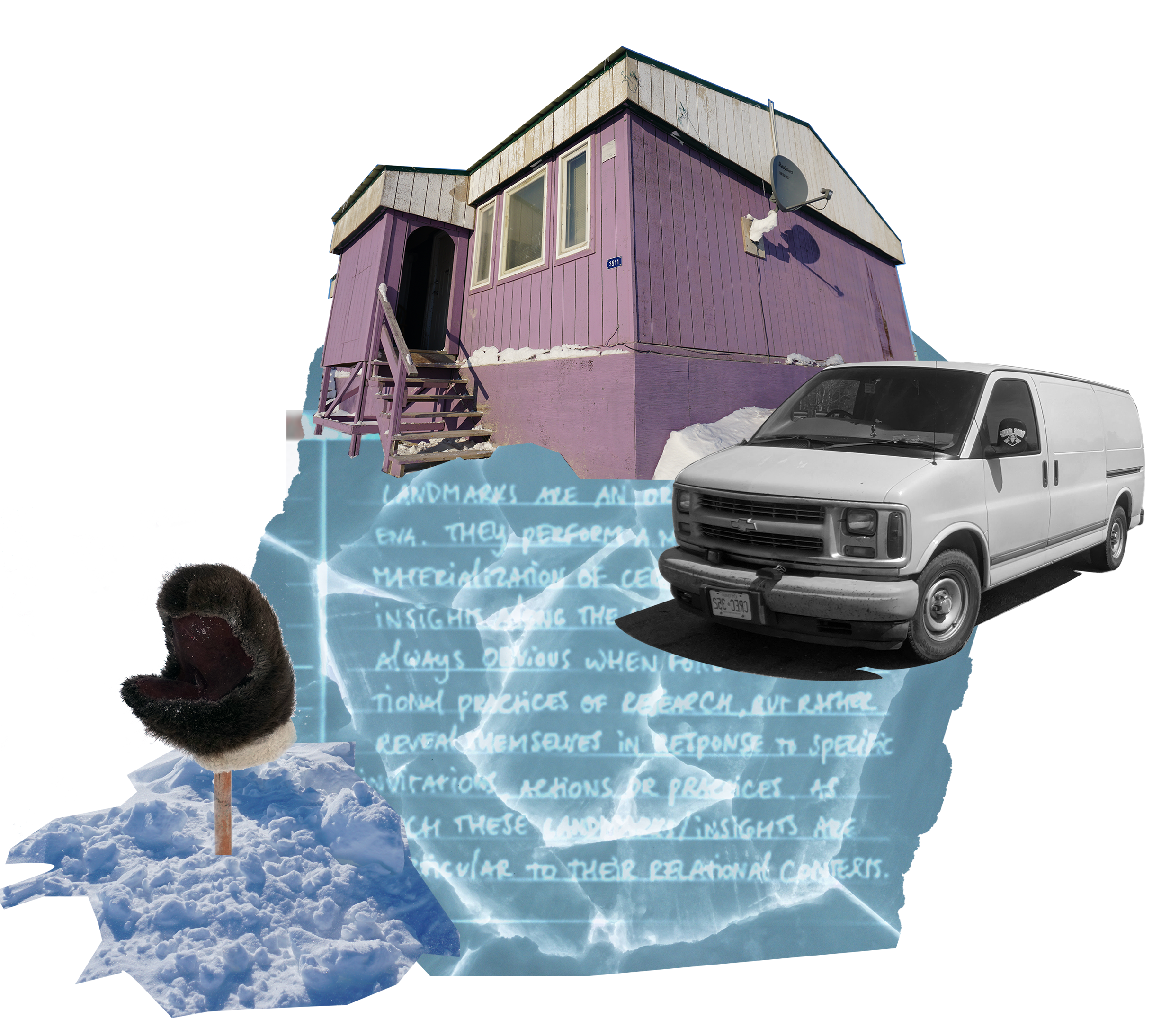Entering into Relationship: Difference between revisions
No edit summary |
No edit summary |
||
| (4 intermediate revisions by the same user not shown) | |||
| Line 1: | Line 1: | ||
[[File:Landmark.png|thumb]] | [[File:Landmark.png|thumb]] | ||
What does a decolonial practice of acknowledging, or honoring, relationships look like in a context of Inuit and non-Inuit encountering each other? | '''What does a decolonial practice of acknowledging, or honoring, relationships look like in a context of Inuit and non-Inuit encountering each other?''' | ||
Keavy Martin ties | And, | ||
'''"Is 'polite' refusal ultimately a colonizing action?<ref>Martin, K. (2016). The Hunting and Harvesting of Inuit Literature. Approaching Indigenous Literatures, 445-458</ref>"''' | |||
Keavy Martin ties these questions up with the ethics of hunting and the matter of eating of animals questions of responsibility with the matter of . She explores | |||
She links the bodily matters of hunting, sustenance and survival - with renewal of life. | She links the bodily matters of hunting, sustenance and survival - with renewal of life. | ||
| Line 10: | Line 13: | ||
"We are reliant upon the bodies of others", and our bodies are always transformed in the process of such sharing, whether it is one body giving itself to another - or one body giving birth to another<ref>Martin, K. (2016 p.452). The Hunting and Harvesting of Inuit Literature. Approaching Indigenous Literatures, 445-458</ref>. Sharing is life. | "We are reliant upon the bodies of others", and our bodies are always transformed in the process of such sharing, whether it is one body giving itself to another - or one body giving birth to another<ref>Martin, K. (2016 p.452). The Hunting and Harvesting of Inuit Literature. Approaching Indigenous Literatures, 445-458</ref>. Sharing is life. | ||
Although such bodily sharing has been part of my experiences in the communities of Gjoa Haven and Coral Harbour through the consumption of Seal meat, Arctic Char, Caribou and Muktuk, this landmark insight refers | <div class="next_choice">Although such bodily sharing has been part of my experiences in the communities of Gjoa Haven and Coral Harbour through the consumption of Seal meat, Arctic Char, Caribou and Muktuk, for me, this landmark insight refers to a less consumptive engagement. | ||
Entering into relationship also means partaking in the reciprocal customs of gifting and sharing, and allowing yourself to be transformed by those processes. | |||
'''Return''' to cut 3 to see how the collaboration in Coral Harbour proceeded remotely</div> | |||
<small><references /></small> | <small><references /></small> | ||
<span class="return to-cut-3 link" data-page-title="Wayfaring the BW project" data-section-id="4" data-encounter-type="return">[[Wayfaring the BW project#Covid-19 Remote Interviews|Return to Cut 3: | <span class="return to-cut-3 link" data-page-title="Wayfaring the BW project" data-section-id="4" data-encounter-type="return">[[Wayfaring the BW project#Covid-19 Remote Interviews|Return to Cut 3: Remote collaboration]]</span> | ||
Latest revision as of 17:11, 28 February 2025

What does a decolonial practice of acknowledging, or honoring, relationships look like in a context of Inuit and non-Inuit encountering each other?
And,
"Is 'polite' refusal ultimately a colonizing action?[1]"
Keavy Martin ties these questions up with the ethics of hunting and the matter of eating of animals questions of responsibility with the matter of . She explores
She links the bodily matters of hunting, sustenance and survival - with renewal of life.
"We are reliant upon the bodies of others", and our bodies are always transformed in the process of such sharing, whether it is one body giving itself to another - or one body giving birth to another[2]. Sharing is life.
Entering into relationship also means partaking in the reciprocal customs of gifting and sharing, and allowing yourself to be transformed by those processes.
Return to cut 3 to see how the collaboration in Coral Harbour proceeded remotely